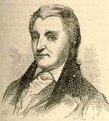|
|
 |
 |
|
Reading Guide |
| 4. |
Hugh Henry Brackenridge, "The Trial of Mamachtaga," in Incidents of the Insurrection, 1795
|
|

|
A true story and a teachable text, this would generate good class discussion. Mamachtaga, a Delaware Indian known for "the ungovernable nature of his passion," gets "mischievous in liquor," kills two white men, and wounds two others. For this he is sentenced to hang. Brackenridge, a lawyer, represents him. In addition to illustrating the plight of the Indian living in the white world, the story offers intriguing glimpses of frontier society and justice: Brackenridge is paid in furs; some Pennsylvanians know as little of the court's operation as Mamachtaga; "crimes against nature" are punishable by death. However, much of the story's appeal comes from the contrast between the naive innocence of Mamachtaga's stoic warrior code and the implacable workings of the American legal system. He chooses the jurors at his trial, for example, according to the "sourness or cheerfulness" of their faces. Brackenridge focuses on Mamachtaga's character, which he illuminates by contrasting his behavior with that of a lynch mob, prisoners he encounters, and finally to the reader's expectations of what Mamachtaga might do when given the chance to escape. 8 pages.
Discussion questions
| · |
How does Brackenridge's view of Mamachtaga compare with Jefferson's view of Indians in general? |
| · |
What implications does Mamachtaga's story have for the effort to "civilize" the Indians? |
| · |
Would "civilization" turn Mamachtaga into a Native American version of The Contrast's Manly? |
| · |
Would Mamachtaga's story reassure readers of the period in the same way Chief Logan's would? |
| · |
What is the significance of Brackenridge's attempts to explain Indian culture? |
| · |
What does this story suggest about cross-cultural communication during this period?
|
» Link |
 |
 |
Topic Framing Questions
| • |
What implications did westward migration hold for national unity? |
| • |
How did the citizens of the early republic think about Native Americans and their place in the developing nation? |
| • |
How did Native Americans respond to the westward press of the United States? |
| • |
How did the United States respond to the presence of Native Americans on the western frontier?
|
|
|
 |
 |
|
 |
